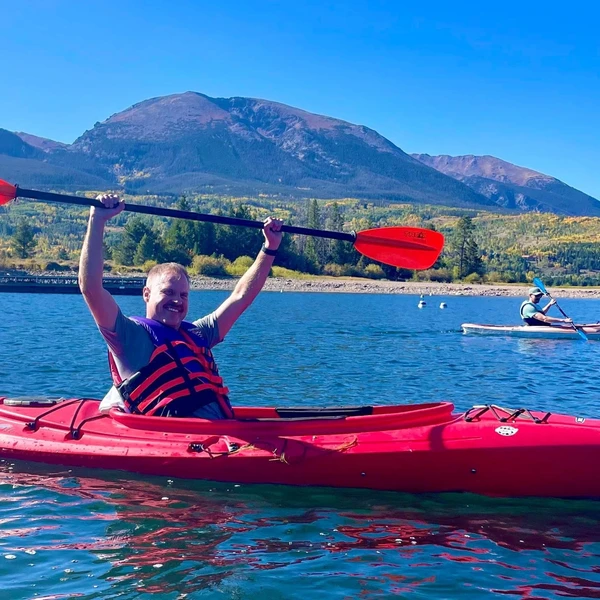
Hobbies and interests
Alpine Skiing
Art
Animals
Advocacy And Activism
Business And Entrepreneurship
Cheerleading
Choir
Church
Communications
Community Service And Volunteering
Human Resources
Human Rights
Meditation and Mindfulness
Neuroscience
Public Policy
Public Relations
Public Speaking
Self Care
Social Justice
Spirituality
Volunteering
Yoga
Reading
Psychology
Business
Spirituality
Magical Realism
I read books daily
Rustin Tonn
1,225
Bold Points2x
Nominee1x
Finalist
Rustin Tonn
1,225
Bold Points2x
Nominee1x
FinalistBio
Hi, my name is Rustin Tonn (he/him). I am passionate about creating workplaces and communities where everyone feels seen, valued, and able to thrive. My journey has taken me through leadership roles in human resources and inclusion work, where I’ve learned that true impact comes from listening deeply, leading with integrity, and creating opportunities for others.
Education is not just a personal goal for me, it’s how I continue to grow in service of others. At MSU Denver, I’m expanding my studies in ways that strengthen my ability to advocate for opportunity, fair chance employment, and inclusive practices. I believe that leadership is about more than titles, it’s about building pathways for people who have historically been overlooked.
I serve on the board of DisruptHR Denver and volunteer with the HR Certification Institute, where I contribute to the development of professional exams. I’ve also served on a range of boards and committees, from student affairs to nonprofits, always with the goal of amplifying voices that need to be heard.
When I’m not studying or serving, you’ll find me at the theater, traveling, adventuring outdoors, or playing pinball. These moments remind me to stay grounded, curious, and enjoy moments of play.
Scholarship support will allow me to focus more fully on my education and the impact I can make. Investing in my learning means investing in inclusive leadership, stronger organizations, and healthier communities. I am grateful for your consideration and the opportunity to keep moving good trouble and good work forward.
Education
Metropolitan State University of Denver
Doctoral degree program (PhD, MD, JD, etc.)Majors:
- Area, Ethnic, Cultural, Gender, and Group Studies, Other
Miscellaneous
Desired degree level:
Doctoral degree program (PhD, MD, JD, etc.)
Graduate schools of interest:
Transfer schools of interest:
Majors of interest:
Career
Dream career field:
Public Policy
Dream career goals:
Advancing Talent through Inclusion & HR Leadership | Specializing in Justice-Impacted, LGBTQ+ & Nerodiverse Communities
Human Resources Manager
eCreek Solutions Group2008 – 20113 yearshttps://www.linkedin.com/in/rustintonn/
Pitney Bowes2011 – 202413 years
Sports
Cheerleading
Varsity2003 – 20052 years
Awards
- Caption
Softball
Club2010 – 20155 years
Research
Human Resources Management and Services
Human Resources Certification Institute — Subject Matter Expert - Exam Development Panelist2014 – Present
Arts
Local
Dance2002 – 2004
Public services
Volunteering
Several — Board2010 – PresentVolunteering
HRCI — SME Panelist2014 – Present
Future Interests
Advocacy
Politics
Volunteering
Philanthropy
Entrepreneurship
Miguel Mendez Social Justice Scholarship
Building Empathy and Opportunity: Reimagining Human Resources for Fair Chance Employment
As someone whose lived experience intersects with neurodivergence, the LGBTQ+ community, and involvement in the justice system earlier in life, I’ve come to understand that reentry into the workforce and the community is not just about second chances. It’s about healing, dignity, agency and rehumanizing systems that too often reduce people to their past mistakes and sorts people into categories of good and bad. My passion lies in evolving human resources and organizational culture so that we stop seeing justice-involved individuals as risks, and start seeing them as resilient, skilled, and deeply worthy of investment and opportunity.
To build a more empathetic and understanding global community, I use my voice, experience, and platforms to educate employers on trauma-informed, reciprocal relationships. For those returning from incarceration, employment isn’t only a job, its stability, purpose, and a connection to society. And for employers, engaging this talent pool requires more than compliance checklists, gatekeeping and risk management. It demands cultural humility, psychological safety, and a willingness to change outdated narratives.
I guide leaders and organizations in developing practices that recognize the complex trauma many justice-involved individuals carry, not just from incarceration, but from the systemic inequities that often led them there. I help companies shift from transactional hiring to relational onboarding: from background checks as barriers to storytelling as bridges. I imagine workshops, strategic advisement, and curriculum development, that support frameworks and workplace culture that foster accountability without shame, support without pity, and structure without surveillance or gauntlets meant to exclude.
My views are not exclusive to justice-impacted individuals. It’s about all of us. A workforce that embraces fair chance hiring strengthens its own emotional intelligence, agility and resilience. Not to mention an ever-growing demand and competition for talent. An HR team that leads with empathy and connection builds trust with every employee and fosters engagement. A community that welcomes people home helps prevent recidivism, poverty, and cycles of harm. Fair chance isn’t charity; it’s talent strategy. And it’s humanity.
My talents lie in my ability to connect across differences, to build bridges between heart and policy, and to translate complexity into action. Whether I’m speaking from a stage, facilitating a workshop, or consulting with a team, I approach every engagement with emotional intelligence, authenticity, and a respect for the lived wisdom and agency that people carry, especially those who’ve survived systems meant to break them.
We don’t need to fix people who’ve been incarcerated. We need to fix the systems that exclude them. I believe HR and employers are uniquely positioned to lead this transformation, not just by opening doors, but by creating cultures that hold them open. My purpose is to make sure we do just that, with courage, compassion, and commitment.